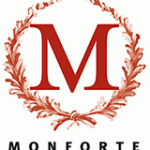Cheese maker comes up with an unusual way to give her factory an edge (via Globe & mail)
Posted: December 3, 2013
Categories: Food in the News

Monforte Dairy logo via official website.
Ruth Klahsen, owner and operator of Monforte Dairy in Stratford, Ontario, is mounting an effort to produce cheese that is not only delicious, but sustainable as well. In a feature in the Globe & Mail, Ms. Klahsen outlines her wish to implement a sustainability project that would enable her to recycle the wastewater from her cheese production through the cultivation and maintenance of algae-filled ponds that would clean the water organically.
A project of such a scope is certainly costly, and the article offers insights from business experts on different avenues of funding. Both for Ms. Klahsen’s innovative solution and for the valuable insights on funding for all small businesses looking to undertake sustainability related projects, the piece is well worth a look.
Below is an excerpt from the article, which can be read in its entirety here:
Though she turns a small profit from her dairy, her restaurant and a small shop in Toronto’s Liberty Village, Ms. Klahsen says she can’t scrape together enough funds for the entire project. “We just don’t have that kind of profit in our company right now. Because we’re new in our location we’re still servicing debt pretty hard,” she says.
Despite this financial uncertainty, Ms. Klahsen has worked for the past three years with Dio Nkurunziza, an environmental practitioner and researcher on microalgae, to plan a system that would pump the dairy’s daily wastewater into one of the three man-made algae ponds.
Based on Mr. Nkurunziza’s research, the algae would absorb environmental pollutants, including whey runoff from the cheese and chlorine and benzyl compounds used as disinfectants to clean the equipment, also restoring the water to a healthy pH balance in the process. Longer term plans include selling the algae for profit.
Once returned to a potable state, the water could be used for the dairy production and to maintain the vegetables Ms. Klahsen grows on her land.
She recognizes that applying for government grants is her surest route, but with so many other side projects on the go she says she can’t do it all herself.
